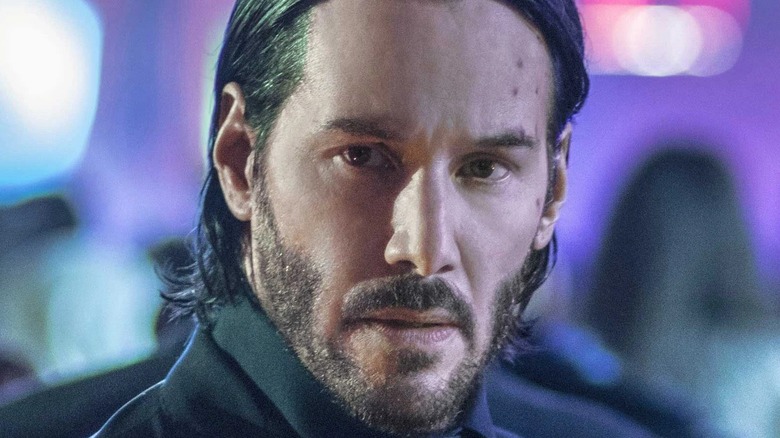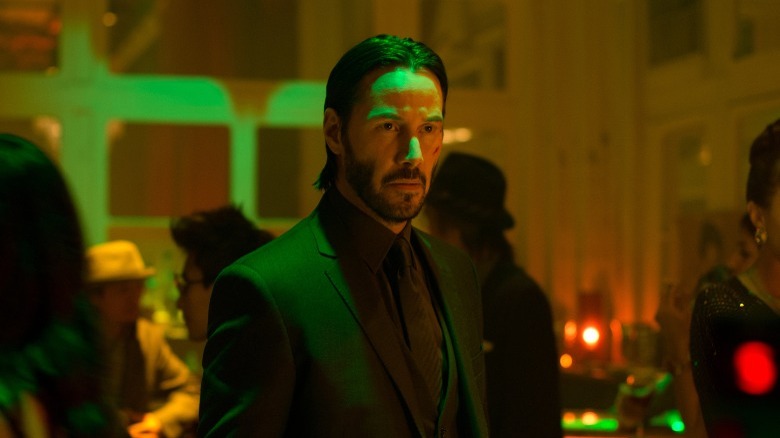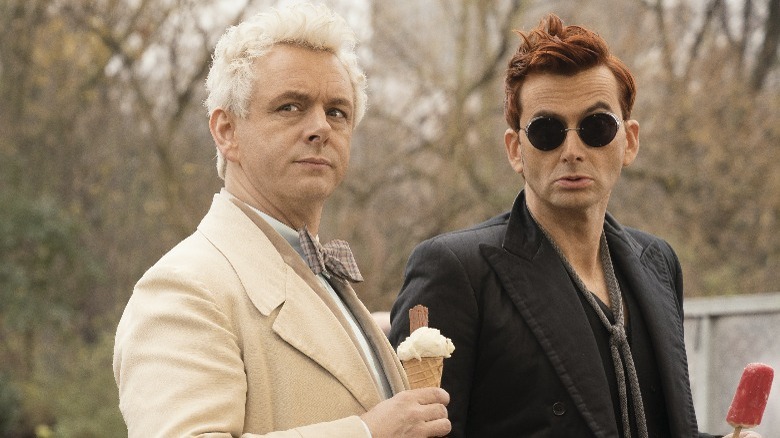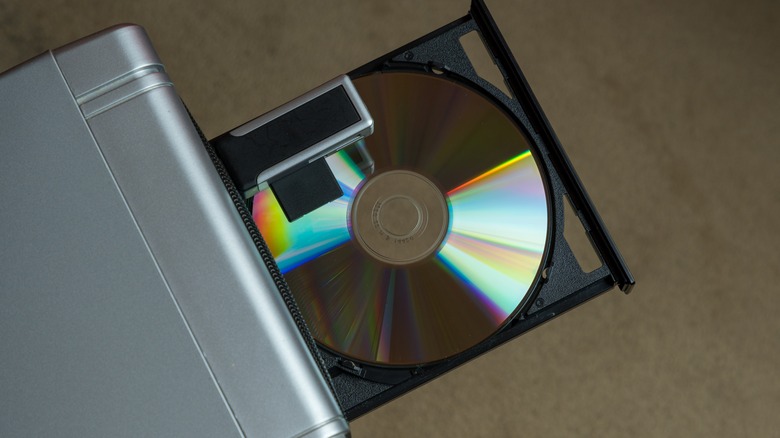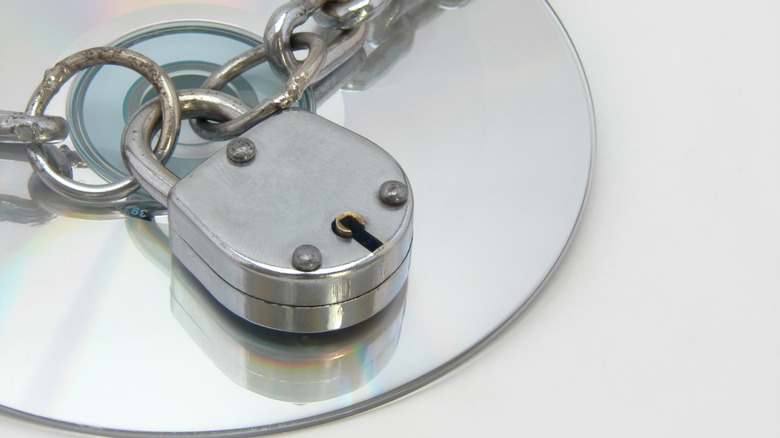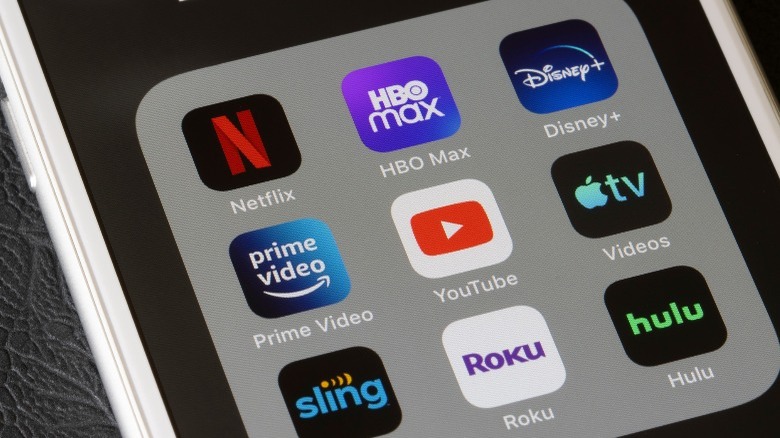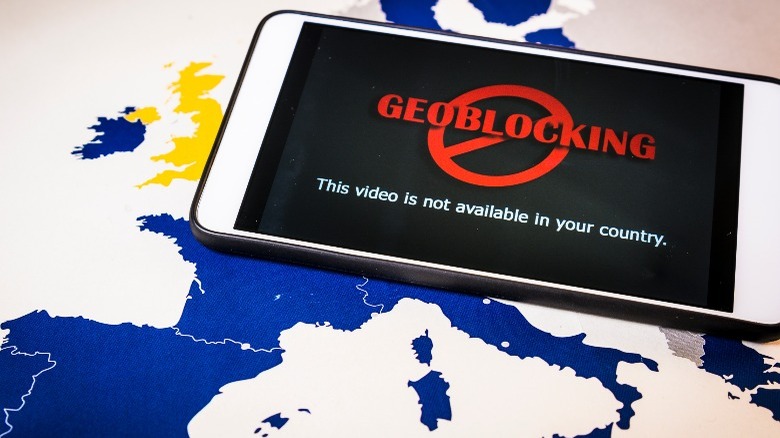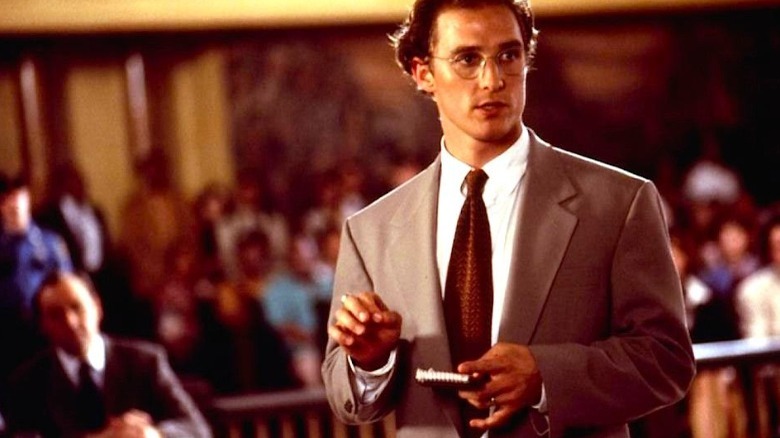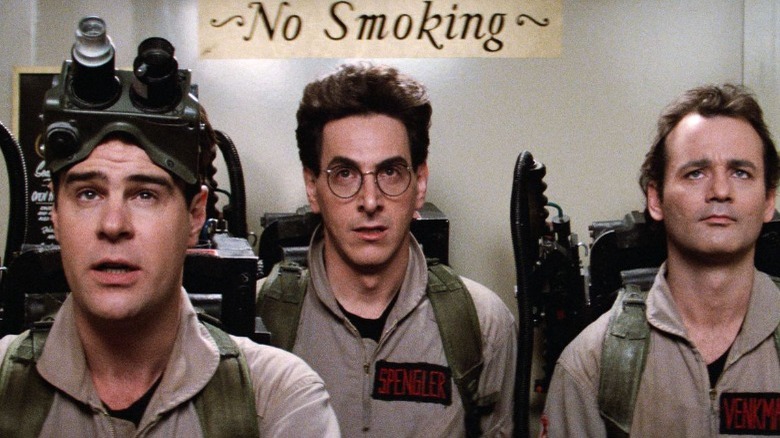You Don't Really Own The Movies You Buy Digitally
We may receive a commission on purchases made from links.
Over the last decade, there has been a huge shift in the way that people consume media content. Not too long ago, people would have their own DVD collections and were largely restricted to movies in those collections when it came to choosing what to watch. Now the world is a very different place, and the advent of high-speed internet has opened up lots of new alternatives to those wanting to consume all types of entertainment.
Streaming services like Netflix, Disney+, Spotify, and even YouTube allow users to stream vast libraries of on-demand content instantly. This has altered the way that people think about ownership of what they watch, with many people preferring the convenience and instantaneous nature of streaming. For those who still want to buy films and not have to rely on a continuing subscription, many stores offer digital purchases.
Unlike with the DVDs and VHS tapes of days gone by, you might not have the same ownership rights when it comes to digital media. It turns out that you might not actually own any of the digital movies you buy online, and these are the main reasons why.
Sony is removing titles from the PlayStation Store
The fact that people who buy digital movies might not actually own them was brought to the public's attention in July of 2022. At that time, Sony revealed that it was pulling hundreds of movies from the PlayStation Store. The company had previously announced that it was ending movie and television purchases in the store due to users moving to streaming-based services. However, it was made clear at that time that any content that an individual had bought would still be available to download and play in the future.
That policy seems to have changed, with Variety reporting that Sony will now remove movies and TV shows from user accounts. All the removed content comes from StudioCanal and will affect PlayStation users in both Austria and Germany. In a statement, Sony blamed the issue on "evolving licensing agreements with content providers" and confirmed that "previously purchased Studio Canal content ... will be removed from your video library." In total, there are over 300 titles that are set to be lost, including the likes of "Tinker, Tailor, Soldier, Spy," "Apocalypse Now," and "John Wick."
Users are unable to download films they purchased
It is not unusual to see changing agreements or expired licenses leading to the removal of certain content from online stores. Although it is relatively rare, the sheer amount of content available online makes it quite a frequent occurrence in the grand scheme of things. A high-profile example of this came in 2021 when Spotify removed hundreds of K-pop songs, with the company telling NME this was due to licensing agreement with music distributor Kakao M.
Yet, the usual process for a title being delisted is that it will no longer be available to rent or purchase but those who have already bought a copy can still access it. This has happened to all types of digital stores and is a common practice in various industries. For example, when Ubisoft revealed to Games Radar that it was removing certain games from Steam, the publisher announced that players with the games in their libraries would still be able to play them.
When it comes to Sony's removal of StudioCanal content from the PlayStation Store, though, this is not the strategy being used. Instead, the company is purging the movies and TV shows entirely, revoking access to content that was legally purchased. In simple terms, users will no longer be able to download or stream this content as they could previously.
Apple reportedly did something similar before
In 2018, Twitter user Anders Gonçalves da Silva sent out a post on the social media site detailing how Apple had seemingly removed several films from his library, including "Cars." During conversations with various representatives from Apple's support, the company told da Silva that it could not restore the removed content but was instead able to offer a number of free rentals as compensation. This was because the content was no longer available according to the support team. Meanwhile, da Silva kept insisting he either wanted a full refund or to have his purchases restored to his iTunes library.
CNET investigated the issue and found that the events were more complicated than they first appeared. The user had recently moved from Australia to Canada and this change in region may have been responsible for his movies no longer being available. However, even if Apple did not actually remove the content directly from his account, it was still unavailable and there was no easy way for da Silva to get back the movies he had previously purchased.
Digital platforms can revoke access to digitally purchased movies
Although few companies have ever removed access to content that has been purchased, almost all digital stores reserve the right to do just that. The Terms of Use will generally include a clause that states customers are not purchasing a copy of a movie but rather a license to view the content. This is very different from what most people would consider ownership, as companies effectively have the power to take away any purchased content.
A good example of these Terms of Use comes from Amazon for its Prime Video service. The fine print reveals that when a customer buys a digital copy of a movie or TV show on Amazon Prime Video, they are actually only paying for "on-demand viewing over an indefinite period of time." The contract also states that content "may become unavailable due to potential content provider licensing restrictions" and that "Amazon will not be liable to you if Purchased Digital Content becomes unavailable."
Even though other services will have slightly different wording, they generally contain provisions that allow content providers to revoke access to purchases for a variety of reasons. Entire digital libraries could be wiped clean according to the Terms of Use of these types of online stores.
It's unclear if customers are even entitled to refunds
Exactly what rights users have when it comes to this type of behavior is unclear. As noted by The Hollywood Reporter, these types of contracts are usually enforceable even if users don't read the Terms of Use. By continuing to use online stores such as Prime Video or the PlayStation Store, users are signaling that they agree to the terms and conditions laid out and accept the fact that content can be removed.
What makes matters worse is that it is unclear whether customers are even entitled to refunds. Amazon's Terms of Use, for example, confirm that Amazon is not liable for any content that becomes unavailable. This suggests that they would not have to offer any sort of financial compensation to anyone who could no longer access their movies and TV shows. Yet, in a similar situation in 2019 when Microsoft stopped selling books on the Microsoft Store, it refunded every purchase made, according to ZDNet, when content was removed from libraries.
Meanwhile, Sony failed to mention refunds when it announced the removal of hundreds of movies from the PlayStation Store and did not respond to Mashable when asked to comment. That means that users could potentially be out hundreds of dollars while being unable to watch anything they have bought.
Customers might not actually own their DVDs
Many people would consider DVDs or Blu-rays their own property, making them distinct from digital purchases. After all, it is a physical item that you can hold and even destroy if you wanted. But it turns out that might not be how the DVD distributors see things and that the situation concerning physical and digital media might be more similar than most people might have initially thought.
The DVD Copy Control Association and the Advanced Access Content System Licensing Administrator sent a submission to the U.S. Copyright Office in an attempt to prove that you don't actually own DVDs. In the filing, the two organizations argue that customers are "purchasing access to the motion picture which affords only the right to access the work according to the format's particular specifications" rather than the motion picture itself. Although the language and reasoning are distinct, the argument here boils down to the same claim that consumers don't own the movies and TV shows they buy.
There is no way to control access to physical media
With digital purchases it is easy to see how a company could revoke access, removing any real sense of ownership that a consumer might feel they have. When it comes to physical media, like DVDs and Blu-rays, there is not really any way in which access can be restricted. Studios or distributors are not going to come to your house and forcibly take any copies of a particular movie that you have previously purchased. That certainly gives an advantage to physical media over content, as it is simply so much more difficult to have your access restricted or removed.
This licensing argument for DVDs appears to be more of an issue over preventing users from circumventing copy protection or using them in ways that were not originally intended rather than any potential ability to stop users from watching them. While this could still be seen as a way of limiting ownership, it offers no real way for anyone to lose the ability to watch a movie or TV show they have bought physically.
Both digital and physical releases are limited to private use
Even though you have bought a DVD, that doesn't mean that you can do whatever you want with the media. There are some pretty strict rules about what exactly is permitted with a DVD even after a person has purchased it. One of the most obvious examples is that most DVDs come with some form of DRM or other technological protection measures. These are designed to stop you from ripping the contents of the disc, which is still technically illegal in the U.S. according to Softonic, and being able to redistribute it
Another way in which your ownership of a movie might be questioned is in the way that you can watch it. DVDs are, for the most part, only licensed for private and personal use. This prohibits them from being aired in public to a wider audience according to the Maryland State Library Resource Center. Essentially, if you want to play a DVD in a public setting, you'll need to apply and pay for a special license.
You can't lend or sell a digital purchase
One of the major advantages of buying physical copies of entertainment media, be it movies, music, or video games, is that you are pretty much free to do what you want with the copies. Consumers can sell DVDs that they no longer want and trade in video games to make back some cash, even if the second-hand market is shrinking somewhat in recent years. It is also possible to let your friends and family borrow a movie or your box set, which they can then watch in the comfort of their own home whenever they want.
These are all things that are simply not possible with digital purchases. Any content bought from a digital store will be tied to a specific account, which is usually only accessible from a certain number of devices at the same time. This makes it difficult to share content without also giving away account information or losing access to it yourself. There's also practically no way to sell on digital purchases, which are only licensed to the buyer specifically according to Which. As The New York Times notes, digital media is often strictly forbidden from being resold at all.
Access to digital titles is at the mercy of the servers
Watching a movie in any form requires certain things, like a working television or monitor and electricity to provide power. However, digital media also needs a working internet connection in order to get access to content. To stream a film or download it to watch later, consumers have to be able to log in to the appropriate website and have a stable connection to the company's servers.
Unfortunately, this is something that cannot always be guaranteed. In a 2019 report investigating internet outages, The Verge found that problems were becoming more widespread and frequent. Any such outage, such as a Cloudflare outage in 2022 that forced hundreds of websites offline according to The Independent, would severely restrict your ability to watch the content you have purchased.
Services such as Prime Video, Disney Plus, and Netflix all depend on the likes of Amazon Web Services, so any potential issue can mean that all of them are knocked offline at the same time. In these instances, it would be almost impossible to watch any digital content, and even previously downloaded offline videos may not be available. That's not even considering your own personal connection to the web, which could cut you off from all of your online purchases if something goes wrong and cannot be easily fixed.
Geographic restrictions can apply to digital content
Geographic restrictions have applied to movies for many years. DVDs are almost always locked to a particular region and are only meant to be playable on DVD players available in the same location. But, as reported in The Washington Post, it has always been pretty easy to bypass this limitation through the use of region-free DVD players or software hacks to get around the restrictions.
Things are more difficult with digital content. Almost every online service has some form of geo-blocking, which restricts what a person can watch or download based on where they are in the world. According to Avast, geo-blocking is normally employed to enforce licensing restrictions from copyright holders. These systems are usually based on an individual's IP address to determine where they are located. However, it can mean that users are shut out from their own content when traveling or if they move to a different country, as licensing agreements may mean they no longer have the right to view that content.
The law has not really been tested in court
Exactly what obligations content providers have to consumers when they sell digital content remains unclear. This is because the issue has never been fully tested in court yet, meaning there is no set precedent about what the likes of Amazon and Apple can reasonably do. One lawsuit, brought by David Andino against Apple, alleges that the company is misselling content as users are not buying the content in the traditional sense because the company can revoke access at any time. The Hollywood Reporter confirmed that the lawsuit had survived a motion to dismiss in 2021, although there has still been no conclusion so far.
Meanwhile, another class action lawsuit that targeted Amazon was thrown out of court by a judge in the same year. Filed in California, the legal action suggested that customers should get unlimited access to the movies they had purchased. According to Top Class Actions, the case was dismissed because the plaintiff had not suffered any injury as Amazon had not removed any movies from her account.
Services shutting down can cause problems for viewers
Even if Amazon and other digital stores never intend to remove your access to purchases, it may be a consequence if they were to ever go out of business. That's because purchases are most often tied to a specific account for each retailer. If that company is simply no longer operating, then a consumer would lose access to everything they have bought. That's because the vast majority of digital content that users own is stored on the cloud rather than locally on physical media according to The Atlantic. Without servers running to host the movies, viewers wouldn't be able to watch them.
Exactly this type of situation has already happened in the past. Film Stories reported in 2019 that when Flixster shut down, users were given the option to transfer their purchases to Google Play. However, a significant number of titles would not be supported in the migration, including "Ghostbusters," leaving those who had purchased certain movies left with no way to access or watch them in the future. Again, there was no mention of what compensation customers would be entitled to or whether there was any way to request a refund.
It's getting more difficult to watch movies you own
In the days of VHS tapes and DVDs, it was always pretty easy to watch a movie. All you had to do was hook up a player to a television set and you were good to go. Basically, every system was compatible and there was very little that could go wrong in the process. This gave a real sense of ownership as you could take your content with you and watch it wherever or whenever you wanted without the need to use a particular manufacturer's hardware.
When it comes to digital purchases, that's not the case. Something bought on iTunes or Amazon Prime Video will only work when you are logged into those specific accounts. Digital stores require users to use particular websites or apps and may only support a limited number of devices. Combine that with the fact that many titles are exclusive to certain stores and it can make it difficult to keep track of everything you own and have it all in one place like was possible with physical media.
